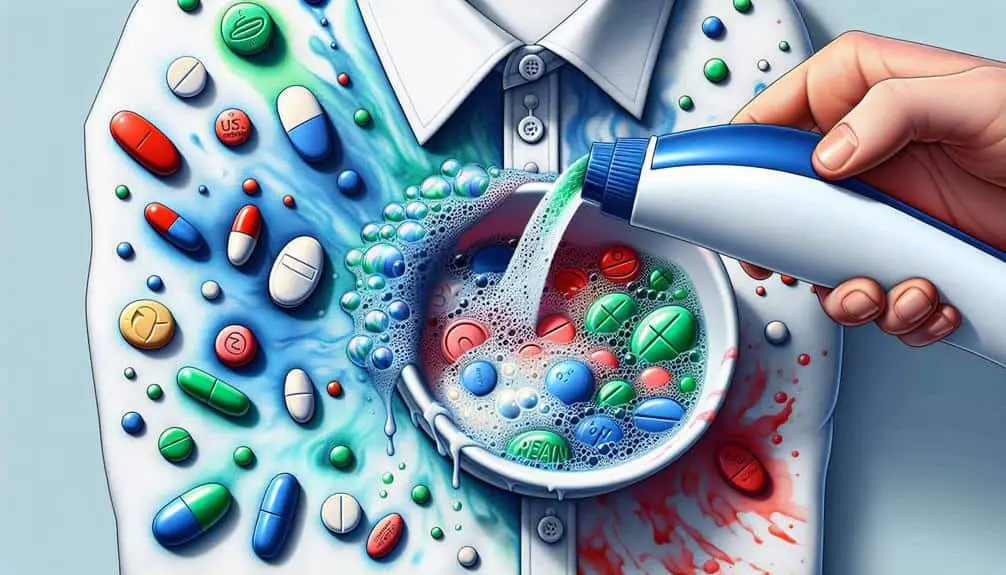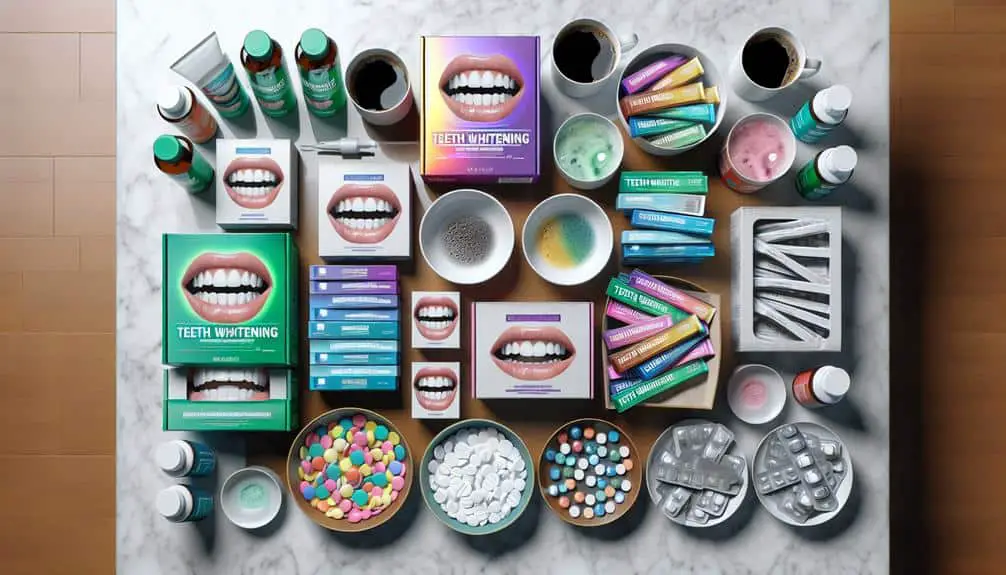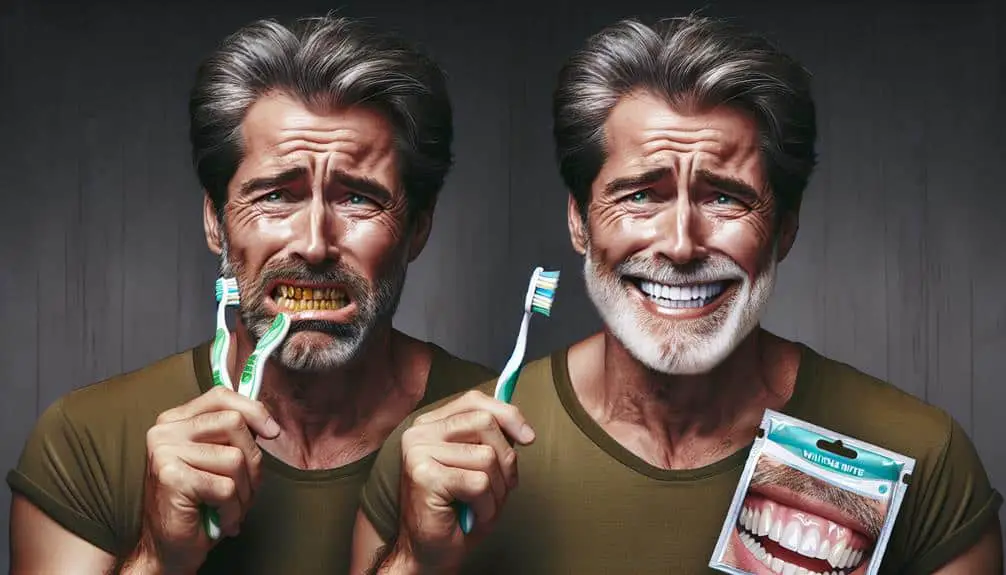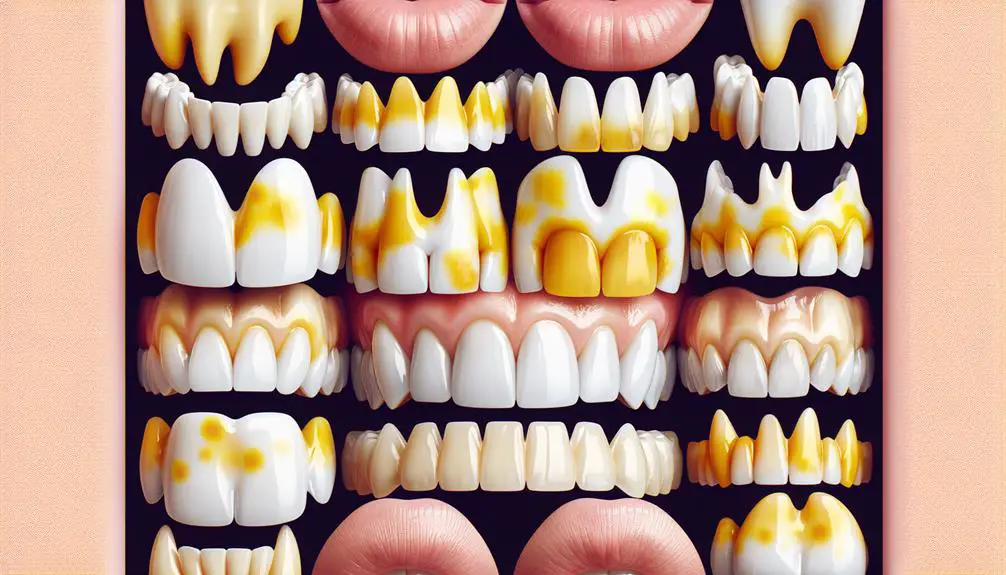Get rid of stubborn medication stains on your teeth by using stain-removing toothpaste and rinsing after taking medication. Think about trying effective whitening toothpaste options or professional whitening treatments for a deeper clean. DIY remedies like baking soda paste or activated charcoal can also work wonders. To maintain your newly whitened smile, establish a consistent oral hygiene routine and limit staining foods and drinks. Using natural remedies occasionally can help too. Explore these techniques to keep your teeth looking bright and healthy.
Key Points
- Identify medication stains' causes for targeted removal.
- Utilize stain-removing toothpaste for effective treatment.
- Incorporate rinsing after medication intake to prevent stains.
- Consider professional whitening treatments for stubborn stains.
- Maintain whitened teeth with consistent oral hygiene practices.
Understanding Medication Stains
To effectively address medication stains, it's important to grasp the underlying causes behind these discolorations. Medication residue left on the teeth after taking pills or syrups can lead to unsightly stains. These stains are a result of the chemicals present in the medication coming into contact with the teeth and causing discoloration over time.
Vital removal techniques play an important role in combating these medication stains. Regular brushing with a toothpaste that has stain-removing properties can help prevent and reduce these stains. Additionally, using mouthwash or rinsing your mouth after taking medication can help remove any residue left behind, minimizing the chances of staining.
Understanding how medication residue interacts with the teeth is essential in effectively addressing and preventing medication stains. By being mindful of the potential staining effects of certain medications and incorporating proper oral hygiene practices, you can maintain a bright and stain-free smile.
Effective Whitening Toothpaste Options
Explore trying out various effective whitening toothpaste options to combat medication stains and maintain a bright smile.
When searching for whitening toothpaste to address medication stains, you can examine natural alternatives or specialty products. Natural alternatives often contain ingredients like baking soda, activated charcoal, or coconut oil, which are recognized for their stain-fighting properties. These toothpaste options are gentle on your enamel while effectively removing surface stains caused by medications.
On the other hand, specialty products specifically formulated for whitening purposes may contain higher concentrations of whitening agents such as hydrogen peroxide or carbamide peroxide. These components can assist in lifting stubborn stains and brightening your teeth over time.
Before exploring any whitening toothpaste, it's crucial to consider your oral health needs and consult with your dentist if you have any concerns. Remember to follow the instructions provided with the toothpaste for optimal results.
Professional Whitening Treatments
Explore professional whitening treatments as a potential solution to tackle stubborn medication stains and achieve a brighter smile. Dental bleaching, a common procedure in cosmetic dentistry, can effectively lighten the discoloration caused by medication stains. This treatment involves applying a bleaching agent to the teeth and then activating it with a special light to break down the stains.
Cosmetic dentistry offers various professional whitening options, including in-office treatments that can provide quick and noticeable results. Dentists may also offer take-home whitening kits with custom trays for a more essential but equally effective approach. These kits contain professional-grade whitening gel that's safe to use under the guidance of your dentist.
Consulting with a dental professional is vital before undergoing any whitening treatment, especially if you have medication stains. They can assess the severity of the stains and recommend the most suitable whitening option for your specific needs. Professional whitening treatments can significantly enhance the appearance of medication stains, restoring your smile's brightness and confidence.
DIY Whitening Remedies at Home
For effective and convenient solutions to brighten your smile at home, try out DIY whitening remedies. Natural remedies offer a gentle yet effective way to whiten teeth without harsh chemicals. Baking soda mixed with a few drops of water to form a paste can help remove surface stains. Another option is to brush with activated charcoal, which may absorb stains and toxins on the teeth. Oil pulling with coconut oil is a traditional method believed to promote oral health and whiten teeth. Additionally, hydrogen peroxide mixed with water can act as a natural whitening mouthwash.
Home solutions for whitening teeth also include consuming crunchy fruits and vegetables like apples and carrots, which can help scrub away plaque and stains. Moreover, strawberries mashed with baking soda are thought to have natural whitening properties. Remember, consistency is key when using natural remedies for whitening teeth at home. Always consult with your dentist before trying any new whitening methods to make sure they're safe for your oral health.
Maintaining Whitened Teeth
To maintain whitened teeth, it's essential to establish a consistent oral hygiene routine that includes regular brushing, flossing, and dental check-ups. Here are some key tips to help you maintain the brightness of your teeth:
- Brush Regularly: Brush your teeth at least twice a day using a whitening toothpaste to remove surface stains and prevent yellowing.
- Floss Daily: Flossing helps remove plaque and debris between teeth that your toothbrush might miss, contributing to a brighter smile.
- Avoid Staining Foods: Limit your intake of foods and drinks that can stain your teeth, such as coffee, tea, and red wine.
- Natural Remedies: Consider using natural remedies like baking soda or activated charcoal occasionally to help maintain whiteness without harsh chemicals.
Frequently Asked Questions
Can Medication Stains Be Prevented With Certain Dietary Changes?
To prevent medication stains, consider dietary changes. Certain foods can impact how stains appear. Altering your diet may reduce the likelihood of stubborn medication stains. Incorporating healthier choices can make a significant difference in stain prevention.
Are There Any Specific Medications That Are More Likely to Cause Stubborn Stains on Teeth?
Certain medications, like tetracycline antibiotics and antipsychotics, are known to cause stubborn tooth stains. To combat this, prioritize dental care. Brush and floss regularly, visit your dentist, and consider professional cleanings to prevent and manage medication-induced stains effectively.
How Long Does It Typically Take for Professional Whitening Treatments to Show Noticeable Results on Medication Stains?
You won't believe how quickly professional whitening treatments work their magic on medication stains! Typically, noticeable results can be seen within a few sessions, but individual timelines may vary based on the severity of the stains.
Are There Any Long-Term Effects on Oral Health From Having Medication Stains on Teeth?
Long-term effects of medication stains on teeth can impact oral health. Dental implications include potential discoloration, enamel damage, and increased risk of cavities. Maintain ideal oral hygiene to prevent these issues and consider professional cleaning.
Can Medication Stains Be Removed Completely, or Will There Always Be Some Discoloration Left Behind?
To remove medication stains completely, utilize stain removal techniques like professional cleanings, whitening treatments, and enamel-safe products. While complete removal is possible, some discoloration may remain depending on the severity of the medication stains.



